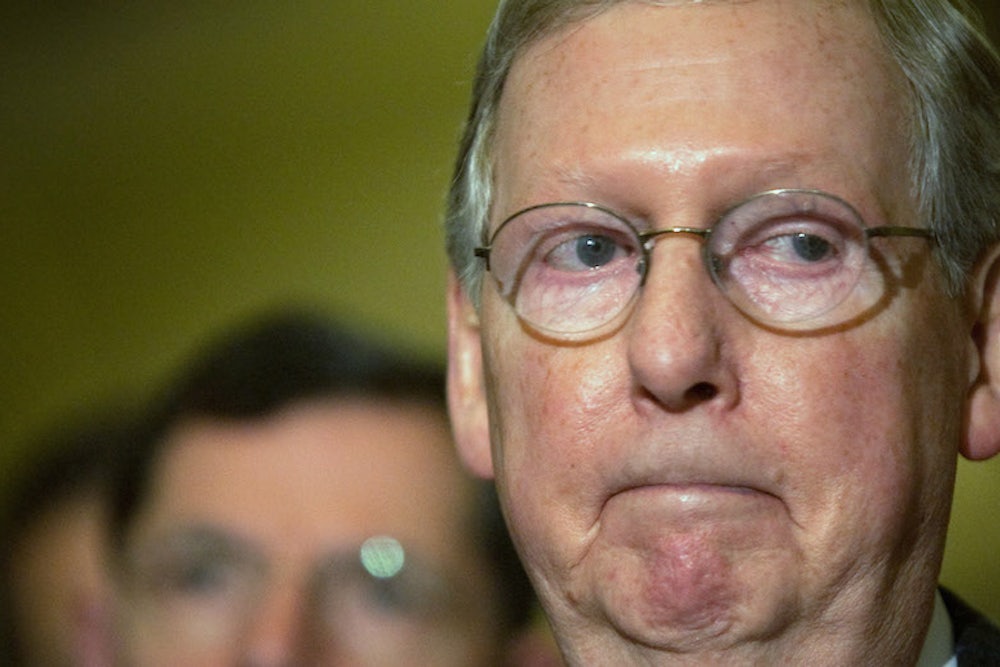With the notable exception of Tennessee's Bob Corker, Senate Republicans united on Wednesday, using their power under filibuster rules to prevent a debate on a bill that would increase the minimum wage gradually to $10.10 an hour.
On a superficial level, this was a staged, political vote with a predictable outcome, designed to draw a distinction between the parties for voters ahead of the midterm election. Increasing the minimum wage is overwhelmingly popular, even in conservative states, and Democrats want the voters to know which party opposes it. Or better yet, to use the minimum wage as a wedge issue and split the party.
But I think there's a lot more to this story than text-book coalition politics, and it could change direction in the weeks and months ahead if Democrats make good on their promise to force the same vote again and again until Republicans budge.
Consider the timing. By sheer coincidence, I'm sure, Democrats scheduled this first minimum wage vote in the spring—months and months before the November election—while Republicans are still contesting their primaries.
To the extent that pandering to the right explains the uniformity of opposition, it confirms a key data point about the GOP and the conservative movement. They don't want to deal on this issue because from where they stand, tolerating the existing minimum wage is a concession.
But the right's leverage over the GOP will diminish in the coming months and at that point, the politics of the issue might break through.
And that will pose questions to Democrats and Republicans alike.
The crass political calculation Republicans will have to make is whether conceding an issue to Democrats is an appropriate price for neutralizing it. Does obstructing a minimum wage increase hurt them more than facilitating it would help Democrats?
And for Democrats, the crass political question (like the GOP and the Keystone Pipeline) will become whether they want the issue more than they want to pass a bill.
Here there are two schools of thought. One, taught by Senator Tom Harkin of Iowa, is that Democrats shouldn't budge from a floor of $10.10. Republicans must cave completely or get nothing. The logic here is enhanced by the fact that passing a bill in the Senate doesn't mean very much if John Boehner's just going to pocket veto it. If it's not going to become law, then Senate Democrats would essentially be weakening their bargaining position for nothing. Negotiating with Republicans as a proxy for negotiating with themselves.
But what if a few Senate Republicans came back with $10.00 or $9.50 or $9.00? Called Harkin's bluff?
That wouldn't fully neutralize the issue for the GOP, it would just move it into the domain of the House and place other Republicans on the horns of the same dilemma. If they killed the bill, the issue will remain as alive for Democratic candidates as immigration reform. If they pass it, minimum-wage workers in many states will make less an hour than they would if Democrats ran the entire government. But as cynical as politicians are, I don't think most Democrats would prefer that those workers get no raise than that they get a modest one, even if a compromise nullifies the political issue.
I think the conventional wisdom is that even if Senate Democrats can muster a handful of Republican votes for a wage hike, House Republicans, driven by conservative hardliners, would kill it. It's probably true. But that doesn't mean other Republicans won't take the other side of the argument.
Former Minnesota Governor Tim Pawlenty thinks congressional Republicans should cut a deal. And while as a blue state governor he was more reform-minded than most Republicans on Capitol Hill, and while he insists he was stating his personal view, he currently serves as CEO of the Financial Services Roundtable—a liaison between the one percent and U.S. lawmakers. And if in that role, he sees an imperative for Congress to increase the minimum wage, I think it says a great deal about the inadequacy of the current wage itself, and the GOP's position.
